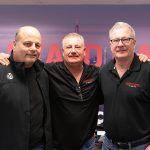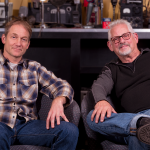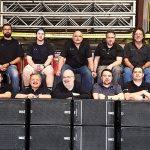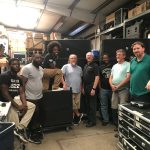And gets on the road to success. . .
A country singer, a tour bus and a new town were the ingredients of success for Mike Borne, who arrived in Nashville in 1979 after being hired to handle the FOH responsibilities for country singer T.G. Sheppard. Five years and 13 number one hits later, Borne decided that it was time to start his own company and get off the road. Thus, Allstar Audio Systems Inc. was born.
“My goal was to develop T.G. into a situation where I could build a company based around his career, and it just wasn’t happening. The tours weren’t developing as I had hoped. It became monotonous getting on the bus and having a truck full of gear sitting in Nashville not getting used,” Borne says now, 23 years after he got off the road. “I could still be on that bus today and where would I be? Making a salary? The only way I was going to break out of the box was to do my own thing. So, I decided I had to sink or swim and I went for it.”
Nashville back in 1984, he recalls, was a much different place. “There were four sound companies. It was a good time. Country music was very popular, still riding the wave of the ‘Urban Cowboy’ era,” he says. “There was quite a bit of work to go around. It was friendly competition.”
So, how much have things changed? “Oh, my gosh,” Borne replies, “now there are probably two dozen sound companies in and around Nashville. Some of them are national companies with offices all over. We have two of the biggest boys here, which really saturated the market with equipment for touring purposes when they arrived. They are pursuing all the same work very aggressively, so the smaller companies get lost.”
Borne wasn’t interested in being one of the lost, so he made the tough decision to look beyond the touring market in the early ‘90s. “Those guys were giving gear away and I couldn’t afford to,” he admits. “Every piece of gear I own, I have to have it make something for me.”
He had done some work at the Opryland Hotel and had made a few contacts in the corporate world. “So, we went off, started doing more and more corporate work and found out that that’s not a bad place to be. It’s not bad working indoor shows with air conditioning and a clean environment. The catering is typically pretty good and they have stage hands,” he says with a laugh. “So, we diversified there.”
To better service that market, Borne brought in a lighting rig because he found that corporate clients preferred one-stop shopping. “It seems that people calling looking for production usually call the sound company and ask the sound company if they can do lighting. They don’t usually call a lighting company and then ask them if they can do sound. I don’t know why that is,” he says. Staging came next and then around the Y2K drama, he decided to buy four diesel generators. Recently he purchased a mobile stage and has added a couple of plasma screens and video cameras to the company’s assortment of gear.
Is It Live, Or. . .
While the company’s list of services has evolved, Allstar began as an audio company. In fact, in 1984, Borne’s collection of gear was split evenly between recording and P.A., and he had to figure out which one offered him the best opportunity to earn a living. “At the time, the live equipment was making me more money, so I sold off all my recording equipment and ended up buying more live P.A. gear,” he explains.
At first, Borne purchased his equipment second hand. “I didn’t wake up one day and have a million dollars to spend,” he admits. “I bought gear a piece at a time, and a lot of gear early on came out of the Trader’s Post, quite frankly, from somebody else selling it. I had some EAW 550s that were about the size of a small refrigerator. Well, maybe not so small, but we had a bunch of those. I loved the sound of that cabinet, but they were huge.” At a gig around town, he saw the EAW 850s and then spent several sleepless nights trying to justify buying a set of the new boxes. “We now have one of the largest inventories of the 850s,” he says, “ We have over 100 boxes.” Borne has been looking at D.A.S., but hasn’t made a move to line arrays yet.
At first, all his equipment was stored in a 20-foot box truck that sat outside of his apartment. When he moved into a 1,000-square-foot home all of the gear went into the basement. “Early on, when we would load the truck to go do a show, we would have to scour the basement floor to make sure there wasn’t a mic cable or anything left behind,” he recalls. “We took everything out of the basement except for the washer/dryer to do a show. Nowadays, we load out a show from the warehouse, I look around and the warehouse still looks full. It used to be a lot easier when you could look around and say, ‘Hey, take everything.’ Now you have to make a list and check it twice.”
Cop the Right Attitude
Allstar is now one of the region’s top suppliers to the corporate market, which Borne says is harder on his P.A. because a talking head will expose the flaw in a sound system faster than a band will, but he still provides sound, lighting and staging to the Memphis in May music festival and to a local rodeo.
He believes that Allstar is able to bounce between the two markets because of the people he hires. “When you’re dealing with corporate events, they want a professional person there to deal with,” he explains. “It’s an attitude. I feel fortunate that we can go do a big rock festival, but we can also do a big corporate show with nice clothes on and a professional can-do attitude. Big companies don’t do well in those markets, because they put employees in that situation who still have rock ‘n’ roll touring attitudes.”
Making sure that he has the right people in place was an important lesson for Borne. “That didn’t come naturally to me, but I’ve learned that people are what makes a company and not gear,” he says. “You’ve got to have quality people and gear is down the chain. The quality of service is what makes the difference, and if you lose the quality of service, then the business goes shortly thereafter.”
Another was that he had to “make decisions that help me sleep at night,” he reports. “I try to do good business. When I’m talking to someone about a job and I know it’s a bid situation, I try to promote Allstar Audio. I don’t try to down the other company that I’m bidding against. You try to promote positiveness, and I think by doing that, people get that vibe.”
Those two things, Borne believes, have given him almost 30 years of success and a client base that decides to return to him on an annual basis. As an example, he points to the fact that Allstar has been providing service to the Memphis in May festival for 19 years. “I’ve really strived to do a good job so that over a period of years a client will hang with you,” he says. “As long as you continue to try your hardest and do a good job and are pleasant to work with, they want to keep you around. So, about 90 percent of the annual work we do is return business.”
That bodes well for the future, he says, but that doesn’t mean that the company can afford to rest on its laurels. “We’ve built a solid foundation and we’ve got a broad client base, but we like new challenges. Otherwise it gets boring doing the same thing day in and day out. So, I’m out there looking for new stuff that’s challenging.”
For a video take on Allstar in Memphis log on to FOH-TV at FOHonline.com.



